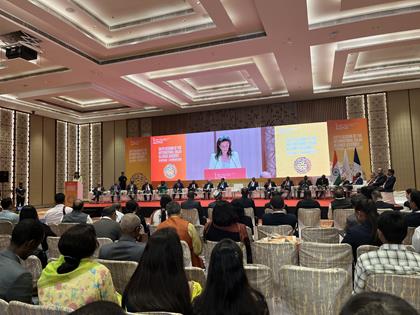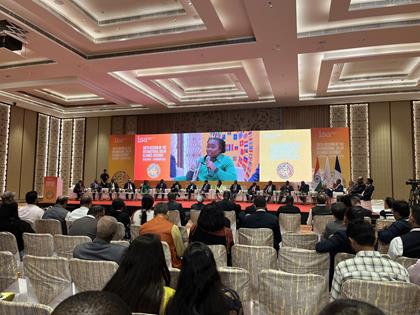Energising the Future: India Leads Solar Energy Advancements at the 6th ISA Assembly
The 6th Session of the International Solar Alliance Assembly in New Delhi marked a significant shift towards renewable energy, with India taking a leadership role.
In a significant step towards global energy transition, India hosted the 6th Session of the International Solar Alliance (ISA) Assembly at Bharat Mandapam, New Delhi, underscoring its commitment to lead the solar energy revolution. The Assembly, held on October 31, 2023, and presided over by Shri R.K. Singh, Union Minister for Power and New & Renewable Energy, saw participation from ministers of 20 countries and delegates from 116 Member and Signatory countries, reflecting the global consensus on the urgency of transitioning to renewable energy sources.
Solar Alliance (ISA) Assembly at Bharat Mandapam, New Delhi, underscoring its commitment to lead the solar energy revolution. The Assembly, held on October 31, 2023, and presided over by Shri R.K. Singh, Union Minister for Power and New & Renewable Energy, saw participation from ministers of 20 countries and delegates from 116 Member and Signatory countries, reflecting the global consensus on the urgency of transitioning to renewable energy sources.
The International Solar Alliance, with its commitment to enable solar energy adoption across its member countries, is at the forefront of this transition. Shri Singh highlighted that renewable energy sources, particularly solar energy, have the potential to decarbonise 90% of the power sector by 2050, providing a clear pathway to reduce global dependence on fossil fuels. The staggering fact that around 80% of the global population resides in countries dependent on fossil fuel imports further underscores the critical role of the ISA in facilitating this energy transition.
One of the highlights of the Assembly was the decision to increase the viability gap funding (VGF) for solar projects in developing countries from 10% up to 35% of the project cost. This significant increase is a strategic move to attract more investments into regions like Africa, catalysing their energy transition journey. The VGF, an essential financial tool, ensures the economic viability of solar projects, making renewable energy adoption more accessible and affordable for developing nations.
The Assembly also inaugurated four solar energy projects across Malawi, Fiji, the Seychelles, and Kiribati, showcasing the tangible impact of the ISA’s initiatives. These projects not only highlight the practical application of solar energy in diverse contexts but also demonstrate the ISA’s commitment to capacity building and knowledge sharing across its member countries.
Shri Singh, in his address, emphasised the dual goals of the ISA: facilitating the energy transition and ensuring energy access. He noted that the organisation is pivotal in addressing the energy access gap, with 733 million people worldwide still lacking access to electricity. By focusing on solar energy, the ISA aims to provide a sustainable solution to this global challenge.
The Assembly also served as a platform for India to share its successful practices in energy access and transition, emphasising the need for a robust techno-regulatory framework to attract private investments. The establishment of a fund, inclusive of insurance and payment security mechanisms, is a strategic move to de-risk investments and encourage private sector participation, particularly in regions with significant energy access challenges.
The role of developed countries in supporting this transition was also highlighted, with a call for providing green funds as per the COP21 commitments. The availability of these funds is crucial for scaling up renewable energy projects, particularly in countries struggling with energy access.
H.E. Ms. Chrysoula Zacharopoulou, France’s Minister of State for Development, reinforced the ISA’s importance, highlighting France’s ongoing support for solar energy development through substantial financial contributions. Dr. Ajay Mathur, Director General of the International Solar Alliance, emphasised the urgency of accelerating solar energy adoption, particularly in developing countries, and highlighted the ISA’s initiatives in capacity building and regulatory change as critical enablers for this transition.
 The 6th ISA Assembly is a testament to the global commitment towards a sustainable energy future, with solar energy at its core. It demonstrates the group’s determination to address the interrelated issues of energy access, security, and transition, paving the way for a future run on clean, sustainable, and accessible energy. India’s leadership and the collaborative spirit of the ISA member countries have set the stage for accelerated progress, moving us closer to realising the vision of a solar-powered world.
The 6th ISA Assembly is a testament to the global commitment towards a sustainable energy future, with solar energy at its core. It demonstrates the group’s determination to address the interrelated issues of energy access, security, and transition, paving the way for a future run on clean, sustainable, and accessible energy. India’s leadership and the collaborative spirit of the ISA member countries have set the stage for accelerated progress, moving us closer to realising the vision of a solar-powered world.
The 6th Session of the International Solar Alliance (ISA) Assembly in New Delhi marked a pivotal moment in the global transition towards renewable energy, with India taking a leadership role. The increase in viability gap funding (VGF) from 10% to 35% for solar projects in developing countries is a strategic move that underscores the commitment to making renewable energy accessible and affordable, particularly in Africa. This is crucial, as these regions are most vulnerable to climate change yet face significant challenges in transitioning away from fossil fuels due to economic constraints. The inauguration of solar energy projects across Malawi, Fiji, Seychelles, and Kiribati is a testament to the ISA’s capacity to drive tangible change and showcase the practical applications of solar energy. India’s sharing of its successful energy transition practices and creating a fund to de-risk investments reflect a holistic approach, addressing both the technical and financial challenges associated with renewable energy adoption. The emphasis on the dual goals of energy access and transition is particularly noteworthy, as it aligns with the global sustainable development agenda. However, the call for developed countries to fulfil their COP21 commitments to provide green funds reminds them that achieving a global energy transition requires collective effort and shared responsibility. The 6th ISA Assembly, therefore, stands out not just as a platform for decision-making but as a catalyst for action and cooperation in the journey towards a sustainable energy future.
